Iranian Malavan Soccer Club Requests Presence Of Women In Stadium
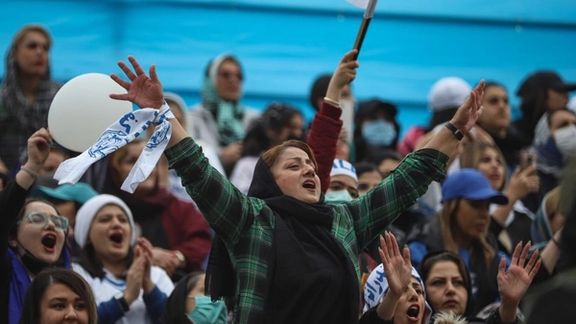
While the ban on the entry of women into sports stadiums in Iran continues, Malavan soccer club has requested the presence of female fans.

While the ban on the entry of women into sports stadiums in Iran continues, Malavan soccer club has requested the presence of female fans.
In a letter to the Bandar Anzali Security Council and the Football Federation on Monday, the club said “the infrastructure of the stadium is suitable for the entry of families and women”, requesting that “their female fans enter the stadium in the 26th week of Iran's premier football league on Saturday.”
On some occasions when a limited number of women have been allowed in stadiums, they were placed in separate sections, not mixing with men but the ban has subsequently led to many arrests, beatings, detentions, and assaults against women.
The request comes amid a government push to enforce hijab on women and a permission to allow them into a stadium would anger hardliners.
The plea comes as the vice president of the football federation announced in February that “until further notice, the infrastructure for the presence of women in the stadiums is not available”.
The international governing body of the football association (FIFA) has tried to convince Iran’s government to lift an unwritten ban on women attending stadiums to watch male players for nearly a decade.
Iranian officials have always argued that male football fans swear profanities, so the atmosphere of stadiums is not suitable for women even if they are seated in a different part of the stadium.
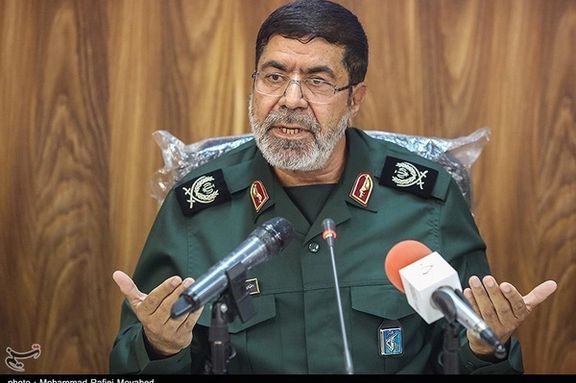
An Iranian IRGC Commander has hailed Palestinian terror groups, claiming 10,000 attacks have been perpetrated against Israelis this year.
Brigadier General Ramazan Sharif, the head of the Intifada and Quds Central Headquarters of the Islamic Propaganda Coordination Council, said on Tuesday that the formation of a unified anti-Israeli front from South Lebanon and the Syrian Golan Heights to Gaza and the West Bank has challenged Israel more than ever. Groups backed by Iran have carried out terror across three of Israel's borders in the last week, in addition to violent unrest in Jerusalem.
"The emergence of young Palestinian resistance groups and the implementation of amazing operations in the West Bank shows the determination of the new generation of Palestine to reclaim their motherland," he said.
He claimed the constitutional crisis in Israel has challenged the hope of many Israelis for survival and alleged “two million residents of the occupied territories are emigrating from Israel, but the Zionists seek to hide this”. He failed to substantiate the wild figure which would be the equivalent of roughly 20% of Israel’s Jewish population, claiming the reverse migration is the impossibility of thinking of a bright future, in ironic echoes of the sentiments felt by the people of Iran.
He announced plans by the Islamic Republic for a 2,500 strong naval parade for civilians to commemorate Quds Day, an annual event held on the last Friday of the Islamic holy month of Ramadan to express support for Palestinians and oppose Israel and Zionism, a region-wide trend begun by the Supreme Leader.

A week after the reopening of universities in the Iranian new year, authorities have once again begun arresting student activists refusing to wear hijab.
Security forces and plainclothes agents have been deployed at the entrance of the universities to prevent uncovered women from entering, including at Tehran University of Arts, where reports claim “veiled women covered them with shawls”.
The student organizations of the University of Arts called these measures "cheap, insulting and intolerable" adding that large numbers of female students were denied entry for refusing the mandatory hijab. Many girls at universities across the country have received warning texts as the country announced new surveillance measures to catch hijab rebels this week.
Students of Noshirvani University of Babol reported that the messages read: "It has been observed that your clothing in the university environment is not in accordance with the norm announced by the ministry of science and university."
In Al-Zahra University of Tehran, in addition to preventing the entry of students who refuse to observe the mandatory hijab, officials notified all students of the "dress code regulations" on the university portal.
Rules specifically stated that the hijab "must cover their hair and neck" and "short, tight, torn, and unbuttoned clothes and pants are not allowed".
While numbers of arrests are hard to verify in the secretive republic, more than 20,000 Iranians have been arrested since unrest began in September, according to rights group Human Rights Activists News Agency (HRANA).
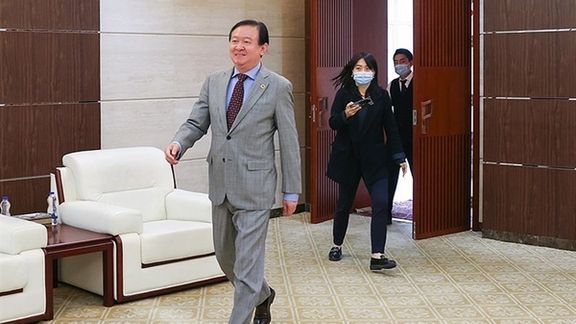
China's ambassador in Iran says Beijing’s mediation between Iran and Saudi Arabia stems from it desire to solve global security issues, not self interest.
In an exclusive interview published Monday by Tasnim news agency, affiliated with the Revolutionary Guards, Ambassador Chang Hua spoke about the reestablishment of relations between Iran and Saudi Arabia, the US troops in the region, and prospects of ditching the dollar in bilateral transactions among other things.
No Chinese media or Iranian media released a transcript of the interview, therefore Iran International cannot independently verify the readout published by the IRGC outlet.
Throughout the interview, Chang used every opportunity to gloat over Beijing’s role in the rapprochement between the arch-rivals, the Islamic Republic and the Al Saud and also reiterating that the US is in decline.
The long-term strategy for long-term peace and stability in the world is to take a new security path with dialogue instead of confrontation, and a win-win policy instead of a zero-sum strategy, the Chines diplomat said.

The talks between Iran and Saudi Arabia in Beijing have provided new examples and ideas for solving global security issues, he was quoted as saying, promising that China will continue to do its best to provide necessary support to Iran and Saudi Arabia and help promote security and stability in the Middle East.
The United States and Western countries make the best use of their hegemony of public opinion, and manipulate contentious issues through deceptive propaganda, he said, claiming that continuous interventions in the Middle East is their tactic to maintain their hegemony.
Chang said that “the Beijing agreement between Iran and Saudi Arabia” was welcomed by the international community but Washington accused China of “entering the Middle East for energy,” which show the evil intentions of the US. “Foreign interference is an important factor that weakens the security and stability of the Middle East... The US has committed serious human rights violations and many other crimes in the region, which has caused permanent and irreparable damage to the countries and people of the region,” Tasnim quoted Chang as saying.
He also urged the international community, especially influential countries outside the region, to respect the sovereignty of the countries of the Middle East and not to interfere in their internal affairs.
“As a good friend of the Middle East countries, China has no personal interest in the region, and has always been committed to the settlement of hot political issues,” he claimed, according to Tasnim.
Following the China-brokered deal to restore ties, the foreign ministers of Iran and Saudi Arabia met in Beijing for the first formal meeting in more than seven years on April 6. After years of hostility that fueled conflicts across the Middle East, Tehran and Riyadh agreed to end their diplomatic rift and re-open embassies in a major deal facilitated by China last month.
Critics in the US have blamed the Biden Administration for pushing Saudi Arabia toward China by pursuing the restoration of the 2015 nuclear deal with Tehran and losing the trust of Saudi leaders, as the great power in the region. The US believes China has a role to play in telling Iran to end its “destabilizing activities,” the State Department said as Iran’s president visited Beijing in mid-February.
However, as Iran moves closer to Russia and China, leading Iranian lawmakers and pundits have warned the government against over-reliance on Moscow and Beijing.
Earlier in the month, a moderate Iranian news website claimed that the Islamic Republic’s frozen assets in China are worth between $22 and $30 billion, suggesting that amid US sanctions even Tehran’s close ally is not willing to pay back its debts.
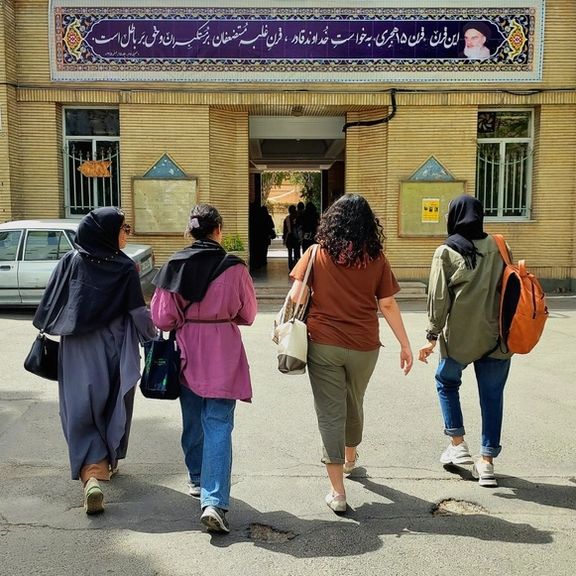
The Public and Revolutionary Prosecutor of a province in Iran says people should report their neighbors to the police if they see them not wearing hijab.
Ali Nesaei also said managers in both public and private sector are responsible for enforcing the hijab rules in the workplace. “If this happens in parks it is the municipality that is responsible. The same applies to universities,” he said at a press briefing while holding the police responsible for controlling the streets and businesses.
Nesaei added that civil servants will be referred to disciplinary committees even if they shed the hijab outside work and that in accordance with article 638 of the Islamic Penal Code they will initially have to pay a cash fine of over 10m rials ($20 or one fifth of minimum wage) for the first time they are charged with violating the hijab law. Vehicles could also be impounded from one to twenty days, if occupants are seen violating the dress code, he said.
Further infringements will entail more cash fines and deprivation from certain “privileges”, he said, referring to threats of seizing drivers’ licenses, passports, etc.
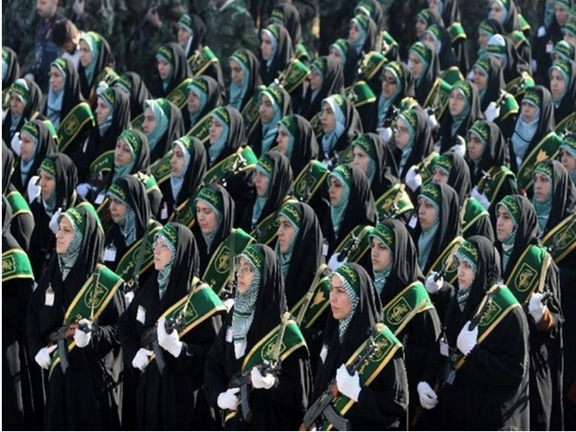
On Friday chief of Iran's law enforcement, Ahmadreza Radan, said that from April 15 police will use CCTV and facial recognition technology to document violation of hijab rules and provide the evidence to the judiciary for legal action against violators.
Radan said after only one warning, vehicles of those who remove their hijab in their vehicles will be “electronically impounded”, clamped on the street, or taken to a parking, while businesses, including restaurants, malls and catering halls will be shut down.
Hardliners keep insisting that most Iranians agree with hijab rules. “It’s good to [announce that] the hijabless will be photographed and that eventually they will be deprived of the privileges they have in the country…and punishments will be meted out to them. They cannot complain in the future because they have been warned,” said lawmaker Ahmad Karimi-Esfahani Monday while claiming that 90 percent of Iranian agree with hijab rules.
Encouraged by some clerics such as Ahmad Alamolhoda, Supreme Leader Ali Khamenei’s representative in Khorasan-e Razavi Province, vigilantes have been attacking hijabless women. Earlier this month, a video of a man pouring a tub of yogurt on the head of a woman in Mashhad went viral on social media and outraged many. Another video has emerged that shows a man, accompanied by several other men and women, beating a woman with his prayer beads.
A man beating a hijabless woman with his prayer beads, apparently after a quarrel over hijab.
“The whistle warning has been blown about the consequences of polarizing [the society over hijab] and pitching people against each other, but hardliners are still not listening,” reformist Shargh Daily said in a commentary Monday.
It appears that conservatives are also aware of the consequences but have been unable to prevent hardliner regime loyalists from going too far to avoid instances such as those seen in the videos of physical assaults that could be embarrassing and backfire against the regime.
In a commentary Saturday, the Basirat weekly of Khamenei’s political representative in the Revolutionary Guards (IRGC) admitted that too much emphasis on the issue could potentially cause people’s confrontation with the regime while accusing the opposition and its media of using hijab controversies to polarize the society and create unrest.
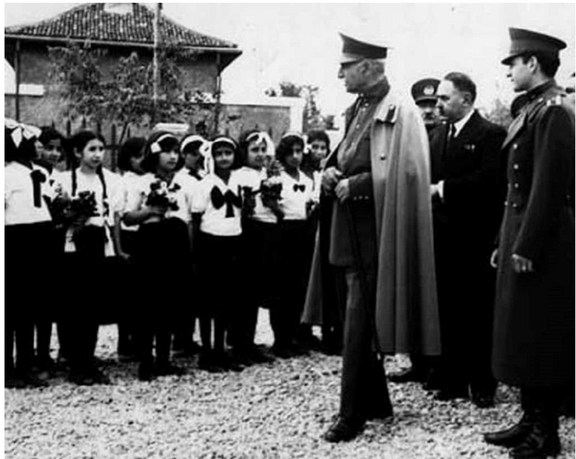
Hijab has been a very controversial issue in Iran for nearly ninety years. The founder of Iran's Pahlavi dynasty, Reza Shah, banned the hijab in January 1939 despite the strong opposition by clerics but a few years later under his son Mohammad Reza Shah Pahlavi the ban fell into oblivion.
Only five months after the Islamic Revolution of 1979, then leader of Iran Ayatollah Ruhollah Khomeini banned hijablessness in government offices. The ban gradually spread to the entire society within the next two years.
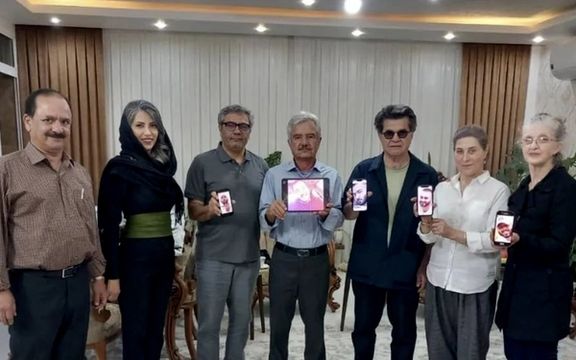
A group of prominent Iranian filmmakers Monday met with the family and lawyer of detained rapper Toomaj Salehi, to express solidarity with him.
According to reports on social media, Fatemeh Motamed-Arya, Jafar Panahi, and Mohammad Rasoulof also inquired about Salehi's health condition during their visit.
The meeting comes as concerns are mounting over the rapper’s condition in prison with human rights organizations demanding his immediate access to medical treatment.
Salehi, 33, an artist mostly known for his protest songs about Iran's social issues and injustice by the government, was arrested in October after joining street protests that had erupted across the country in September after the death in custody of Mahsa Amini.
His arrest came shortly after his interview with the Canadian Broadcasting Corporation, calling the regime “a mafia that is ready to kill the entire nation... in order to keep its power, money and weapons”.
The Center for Human Rights in Iran (CHRI) says the detained rapper needs urgent treatment, which cannot be provided in prison.
On Sunday, Iranian activists living in Montreal, Canada held a rally calling for support for the imprisoned protesters in Iran, including Toomaj Salehi.
The 33-year-old metalworker from Esfahan is one of dozens of members of the artistic and entertainment community who have been arrested since the protests began as the regime struggles to contain widespread discontent in the country.